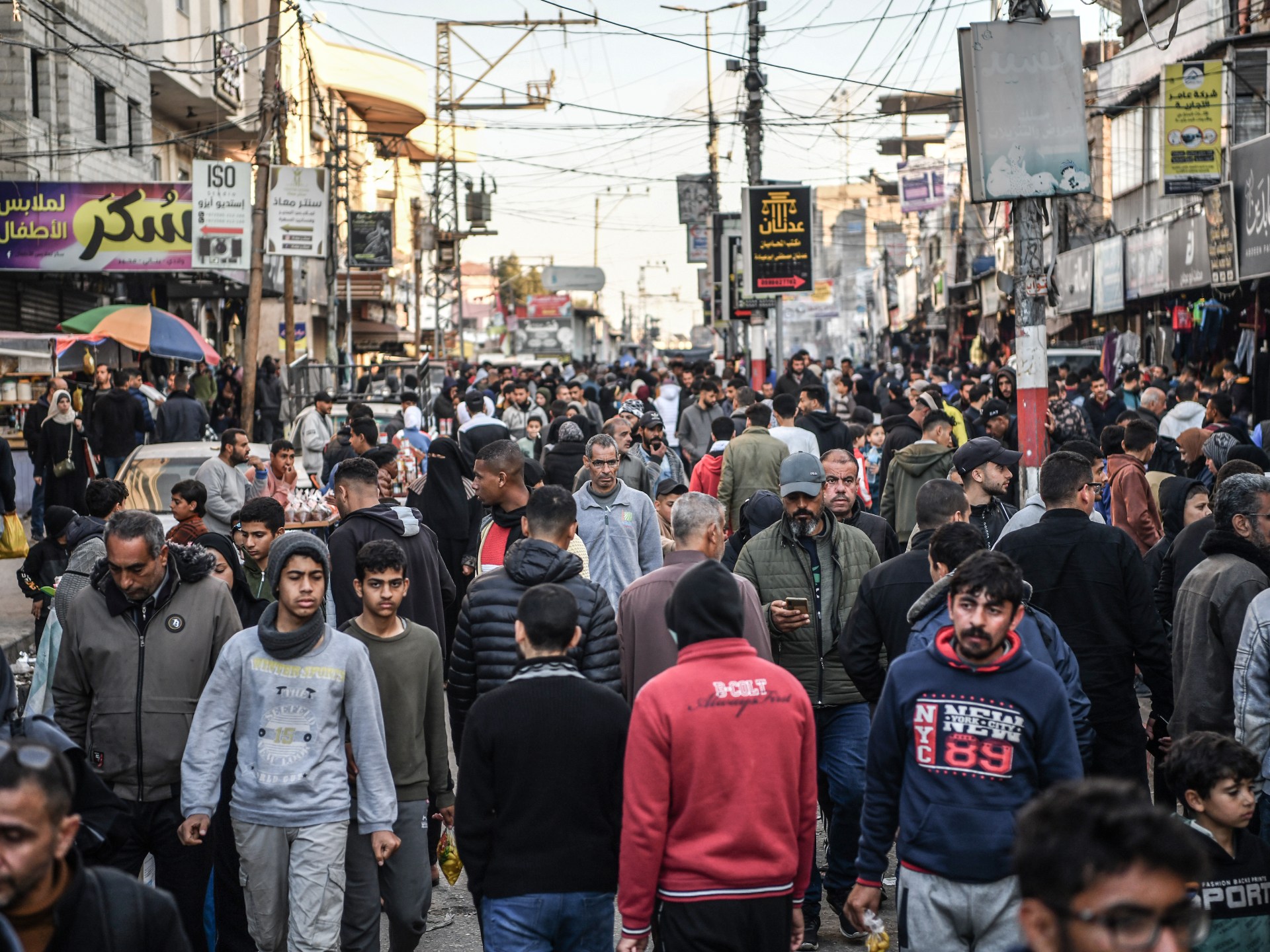Rafah, crowded with displaced people, faces Israeli threats of possible invasion (Anatolia)
Reuters on Monday quoted Israeli and regional officials as saying that Israel expects to continue large-scale combat operations in the Gaza Strip for another 6 to 8 weeks, as part of its preparations to launch a ground attack in the city of Rafah, which is crowded with displaced people in the south of the Strip.
This comes because Israel believes that it can cause significant damage to the capabilities of the Islamic Resistance Movement (Hamas) in Rafah, paving the way for a shift to a less intense phase of targeted air strikes and special forces operations, according to what Reuters quoted the aforementioned sources.
Former Israeli intelligence official and negotiator in the first and second Palestinian intifadas, Avi Melamed, said that there is a small chance that the government of Israeli Prime Minister Benjamin Netanyahu will respond to international criticism to cancel the ground attack on Rafah, adding that achieving Israel’s goals in the war is linked to eliminating the Hamas brigades in Rafah, as he put it.
Israeli Defense Minister Yoav Galant said last Friday that the Israeli Defense Forces are planning operations in Rafah targeting Hamas fighters, command centers and tunnels, without specifying a timetable for the operation.
Galant claimed that there are 24 Hamas battalions in Gaza and the Israeli army has dismantled 18 of them, claiming that Hamas's next center of gravity is in Rafah.
World leaders fear a massive humanitarian catastrophe in Rafah, adjacent to the Egyptian border, which houses more than a million displaced people who have no place to seek refuge.
Delay the process
Melamed also reported that the only possible delay to the Israeli attack on Rafah could occur if Hamas made concessions in the negotiations and released the detainees, according to his description.
He added that if this happened, it would only delay the progress towards Rafah, unless it was accompanied by the disarmament of the city and the surrender of the Hamas brigades there, he said.
Hamas demands an end to the Israeli aggression on the Gaza Strip, the withdrawal of the occupation army from it, and the release of a large number of Palestinian prisoners. This is what Israel rejects and Netanyahu describes as “delusional” demands.
American sources told Reuters that senior American officials believe that reaching an agreement to release the remaining detainees in exchange for a long truce to the conflict is the best way to pave the way for broader talks.
They added, however, that they are concerned that such an agreement may not be achieved in the coming weeks, and that the war will continue until the month of Ramadan in March and April, which may lead to intensifying global criticism of the Israeli war.
Hamas is ready
For its part, Hamas reported that the "victory" promised by Netanyahu would not be possible, stressing that it was prepared for a long war.
Reuters quoted an unidentified Hamas official as confirming that the movement can continue fighting and is prepared for a long war in Rafah in particular and the Gaza Strip in general.
The movement official added that Hamas estimates that it lost about 6,000 fighters during the war that has been going on for 4 months, while Israel claims that it killed 12,000 fighters in the movement.
However, Hamas leader Izzat al-Rishq denied the validity of the statements attributed to a source in the movement and quoted by Reuters, saying that there is no truth to what the agency reported about the number of martyrs of the Qassam Brigades during the fighting in Gaza.
Back to the north
Reuters also quoted an Israeli security source and an international relief official as saying that Israel is considering sending the displaced in Rafah again to the north of the devastated Strip to launch its ground operation there, after ensuring that they do not belong to the Hamas movement, and it may build a floating dock north of Rafah to enable the arrival of international aid and ships. Hospitals across the sea.
However, an Israeli defense official told Reuters that Palestinians would not be allowed to return to northern Gaza en masse, and would likely build temporary tents around Rafah, while regional officials warned that it would not be safe to move a large number of people to the north without electricity and running water. In addition, the area is still full of unexploded ordnance.
Informed officials said that Washington is skeptical that Israel has made sufficient preparations for the safe evacuation of civilians, despite its promise to do so, and US President Joe Biden said last Friday that he does not expect a “comprehensive” Israeli ground invasion to take place soon in Rafah.
Egypt denies displacement
Amid the repeated question, “Where are we going?” Among the displaced people in Rafah, Egypt affirms its rejection of the forced displacement of Palestinians in the Gaza Strip within the framework of an international and Arab refusal to repeat the Nakba.
However, 3 Egyptian security sources told Reuters that Egypt is paving the way for an area on the Gaza border that can be used to house Palestinian refugees as an emergency measure if an Israeli attack on Rafah leads to a mass exodus across the border.
Meanwhile, Reuters notes that the Egyptian government denies making any such preparations.
Gallant also said that Israel has no intention of evacuating Palestinian civilians to Egypt.
After the war
Israel still opposes any agreement that includes a permanent ceasefire or the establishment of a Palestinian state, despite American pressure and international protests denouncing the suffering of civilians in Gaza and the lack of progress towards a permanent peaceful solution.
According to several sources in the region, including Hamas and Palestinian Authority sources, quoted by Reuters, any attempt to form a government to administer Gaza after the war can only succeed if it obtains Hamas’ approval.
Source: Reuters

